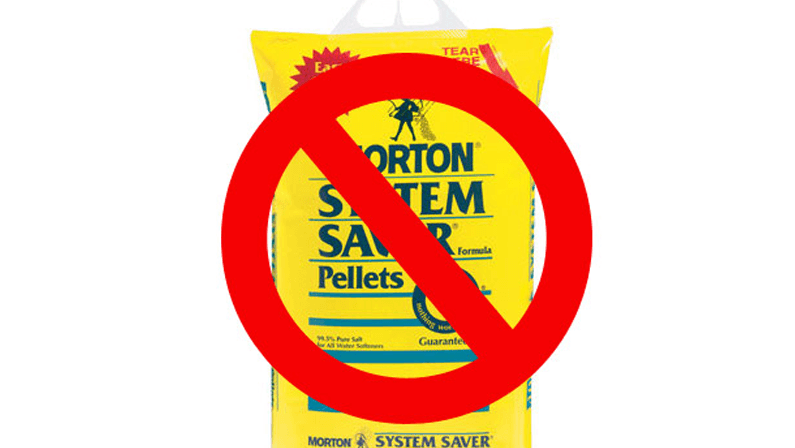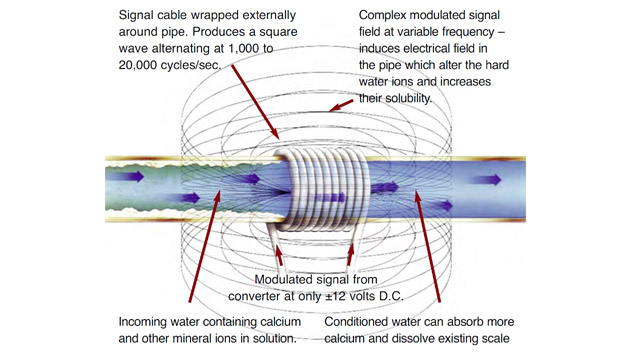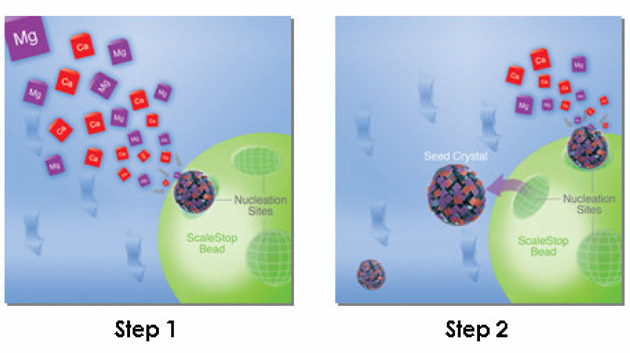Saltless Water Softeners: Fact or Fiction?

Saltless Water Softeners, or Salt Free Softeners would be the ultimate in convenience.
Hard Water is caused by Calcite, Gypsum, and Dolomite rock formations that dissolved into the water supply. It really is a measure of how much “dissolved rock” is in your water.
Hard Water plugs things up, scratches glassware, and is an expensive nuisance.
Conventional water softeners are effective at stopping hard water problems. But they also require heavy bags of salt and potassium to work.
There is a new crop of “alternative products” that claim to “soften without salt”.
Sounds good, but do they actually work?
The Definition of a Water Softener
Soft water, by definition, must contain less than 1 grain per gallon (gpg) of hardness (USGS Hardness Scale).
Water tests before-and-after both ion-exchange water softeners and membrane-based softeners can produce measurable results, ie: 21gpg hardness reduced to 1gpg.
NSF Standard 44 is a certification for this type of performance.
Saltless Water Softener Options
The alternative devices often sold as “No Salt Softeners”, mainly fall into two categories:
Magnetic “No Salt Softeners”
These systems are advertised on TV, Radio, and the Internet. They’re small in size (like a small shoe box) and install in only a few minutes. You simply clamp or wrap wires around your plumbing.
Magnetic Water Softener theory uses a “Complex modulated signal field at variable frequency that induces an electrical field in the pipe. This alters the hard water ions and increases their solubility.” That was hard to type, let alone read 🙂
Template Assisted Crystallization “No Salt Softeners”
A handful of private labeled systems use ScaleStop filter media manufactured by Next Filtration. This filter media uses a technology called Template Assisted Crystallization (TAC). These “physical water treatment” systems are installed much like a conventional water softener.
Physical Water Treatment involves transforming normal dissolved hardness minerals into undissolved “seed crystals”. These crystals are supposed to stay suspended in the water and have a greatly reduced ability to react and attach to surfaces like “normal hard water” does.
How Saltless Water Softeners Work
Both technologies work on a theory of changing “Hard Minerals into Soft Minerals”.
The amount of mineral content in the water doesn’t change. In theory, the type or shape of mineral changes.
Current water analysis methodologies make these technologies hard to support:
There’s no easy “Real World” method like testing water hardness “before and after” tell if the product works.
As a result, there is no industry standard performance rating like NSF 44 either.
Systems may have certifications like NSF 42 for chlorine reduction if it also uses Carbon Filtration. There may also be structural integrity or electrical certifications. These may give the “appearance” of being certified as an effective “water softener”. If misapplied, those labels really just add to the confusion.
No Salt Softener vs. Traditional Softener Benefits
The No Salt Softener concept implies that you will receive the same benefits as a conventional softener.
Soft Water Benefits (less than 1gpg) include:
- Spot-free glassware
- Cleaner, softer laundry
- Less cleaning and chemicals required
- Fewer plumbing and appliance repairs
- Improved energy efficiency in water heaters
These are the benefits our commercial and residential customers need.
Independent Performance Testing for Saltless Water Softeners
Independent 3rd party lab testing suggest that these “No Salt Softener” devices do not deliver the traditional benefits of soft water. While they may work in some circumstances, they do not work in all water conditions in a consistent, predictable way.
Army Corps of Engineers
2001 research findings do not support the claims of the manufacturers regarding the ability of their respective devices prevent mineral scale formation in hot potable water systems.
Click here to download the report
Penn State University
Found virtually no valid scientific data to support any water treatment benefit from magnetic devices. Click here to download the report
Purdue University
240 day long test comparing 6 unidentified magnetic water softener devices to untreated water. No beneficial effect was seen for the magnetic treatment devices.
Click here to download the report
South Dakota Magnet School of Mines & Technology
Tested two different classes of magnetic water treatment devices. Measurements included boiling point depression, surface tension, water conductivity and “scaling Rate”. No difference seen between raw water and magnets.
Click here to download the report
Water Quality Association (WQA)
Research determined no performance test standard for Physical Treatment Devices exists in the US for “Salt Free” devices.
Click here to download the report
Water Quality Association (WQA)
A combination of 34 reports indicate that physical water treatment does not work in a consistent and predictable way.
Click here to download the report
Conclusion
As a company, we are open to the idea of using these “alternative technologies”. However, as of 2012, we have not found a good fit for our residential or commercial customers.
Under certain circumstances the No Salt Softeners may help reduce scale in industrial boiler applications.
Premier Water can provide our clients with High Efficiency Water Softeners. These systems use ion exchange technology, but often reduce salt by 70% over standard softeners.
We also specialize in Membrane-based Water Softeners as a legitimate salt-free alternative. These systems also produce purified, chemical-free water in addition to providing soft water benefits.
Please call us at (952) 479-4553 if you would like to discuss the best options to treat your water.
We can also provide a no obligation Water Test to arm you with the information needed to select a Water Treatment System.



Thanks for sharing this informative post to us! This adds more knowledge about water softeners as well as salt less water softener. Keep posting!
I am so confused!!! I’d owned a Kinetico water treatment system since 1993. After going through 6 or more water heaters, and eventually 2 pin hole leaks in my copper pipes, I’m a hard sell anymore to believe that the soft water did not cause most or all of the now, several thousand dollars in repairs/replacements. I am doing a repipe to PEX through my attice very shortly. How refreshing it would be if all experts could come to the same conclusion, and quit confusing the consumer.
Richard
Melbourne florida
Thanks for the note Richard! Corrosion can occur with low pH, high pH, low hardness, high hardness, low TDS, high TDS….
The list goes on! From our local experience, it usually not “water quality-related”, but due to electrolysis from improper grounding, dissimilar metals, etc. It can be tricky to solve, your re-plumbing with PEX might be the easiest solution for you. Good luck!
Tried to read the reports listed on your web page regarding testing done on no-salt water softener alternatives by the Army Corp of Engineers, Penn State, Purdue, South Dakota Magnet School of Mines & Technology and the Water Quality Association but every link I clicked came back with the same error “PAGE NOT FOUND”.
Thanks for the message! The link should work for you now!
You ought to be a part of a contest for one of the greatest websites online.
I will highly recommend this blog!
Not sure from the data above. Do you sell the TAC systems?
Thanks for posting!
We do offer TAC systems if a client insists. It’s important to explain what they will and won’t do as best we can. We find a softener, or membrane system will provide better results (or at least what our client is after).
– Lars
HAVE BEEN IN THE WATER TREATMENT BUSINESS FOR 27 YEARS AND HAVE TRIED MANY NO-SALT FILTRATION UNITS TO FIND NONE OF THEM WORK. I WISH ONE OF THEM DID… I’D SELL THEM. THE ION-EXCHANGE IS THE BEST FOR ALL OUR CUSTOMERS.
Totally agree George! Our thoughts exactly.
Thanks for posting!
Your thoughts on the claims made by Aquasana Premium Rhino Whole House Water Filter.
We are not affiliated with that company, and they are a competitor. Those systems use KDF and Carbon – neither of which reduce water hardness. The system would be better if the KDF was backwashed (as the KDF manufacturer recommends). You can search for KDF on our site to find a few articles that go into more detail.
Thanks for posting!
Hi. I appreciate your candor here. What do you say to customers like me who HATE the feel, taste, everything about “softened” (ion exchanged) water? I mean, I really, really, really can’t stand it.
I have been willing to live with the lime scale and low sudsing detergents, but the high mineral content of our water gives my kids GI trouble.
Thanks for your time!
Whole House Reverse Osmosis is a great alternative to salt-based softeners. You eliminate scale, reduce mineral content, but do not get the “slippery feeling”.
Thanks for posting!
I too hate the slippery feeling of “soft” water… I live in an area with extremely hard water (which I don’t mind), but this causes a lot of scale, buildup and wear and tear on my appliances (ex: I can’t use the ice-maker in my refrigerator because I end up with yellowish, crusty ice).
As an alternative to a salt-based system, I have been looking into “template assisted crystallization”, but can’t seem to find anything definitive about it either way.
I have also looked at whole house reverse osmosis systems, but read somewhere that this changes the PH of the water, which can be bad?
Can you comment on TAC systems in general, and if there is any other option for preventing hard-water scale / build-up without using salt or making the water “soft”?
Thanks!
TAC systems are supposed to alter minerals, essentially making them inert. We have installed TAC systems for a few customers that wanted to try this technology. We prefer whole house RO, or a standard softener as both technologies are effective, and you can measure the results (TAC treated water measures the same BEFORE and AFTER treatment).
Thanks for posting!